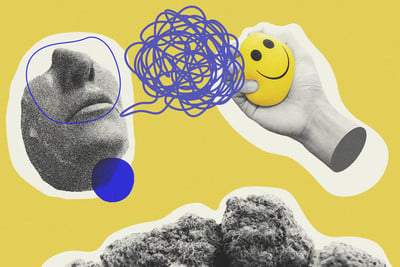.

Cannabis, CBD, and Psychosis: What You Need To Know
Research shows a link between the psychotropic effects of cannabis and psychosis. But where does the non-psychotropic cannabinoid CBD fit into the picture?
Psychosis, in broad terms, is a condition where one loses grip on reality. This can manifest either in a transitory and reversible episode (usually secondary to trauma or consumption of a psychoactive substance) or in the worse case scenario, an enduring chronic condition that severely impacts one’s life and the lives of those around them.
Psychosis can take on many shapes and forms. It is one of the main components of several mental disorders such as schizophrenia, paranoid delusion, megalomania, and acute bipolar disorders. These psychotic episodes are usually quite elaborate and enduring. In fact, in some cases, they can co-exist for years in otherwise healthy individuals until the time comes where confrontation with reality becomes too hard to sustain.
These symptoms can range from hallucinations (hearing voices, seeing things) to elaborate delusions like being the target of a grand conspiracy. Other, less obvious symptoms include disrupted thought patterns, elementary core changes in behaviour, unusual or false beliefs, and changes in perception.
A deep form of depression can be considered a mild form of psychosis. In fact, some antidepressants are also antipsychotics, and vice-versa. The world of mental health is far from parametric certainty.
CANNABIS AND PSYCHOSIS
For decades, cannabis was accused of being a main trigger for the onset of psychosis and even schizophrenia. It was an obvious deduction. Firstly, it is quite common for new tokers to be overwhelmed with the effects of cannabis, where increased heart rate and a panic attacks can, in fact, evolve into a benign psychotic episode. Secondly, the high percentage of weed users in psychiatric wards is a statistical anomaly compared to the general population.
Institutionalised mental patients are studied inside out, and three common denominators often seem to be present; alcohol, tobacco, and to a much lesser extent, cannabis. Still, its use is fairly widespread in these circumstances.
Today, it is acknowledged that in the case of cannabis, it may be a simple case of statistical relief bias. On one side, there is a clear correlation between cannabis use and early onset of mental illness, but equally so[1] for amphetamines, cocaine, hallucinogens, inhalants, caffeine, and tobacco. Inversely, alcohol, opiates, and sedative-hypnotics seem less prevalent compared to control groups.
What is meant by this is, it is possible that several mental conditions can be relieved with weed. This explains why such a high percentage of this skewed data set are cannabis users. It is theorised that patients learn to relieve their symptoms[2] by getting high and soothing the mind.
Despite empirical evidence, facts are not determined from anecdote. It takes statistically significant data to prove a point. And that is precisely what happened at the King’s College London, where a novel study brings new light to an old debate.

CANNABIDIOL AND PSYCHOSIS — THE RESEARCH
Professor Philip McGuire from King’s College London’s Institute of Psychiatry, Psychology & Neuroscience (IoPPN), is the main author of a 2017 paper[3] entitled “Cannabidiol (CBD) as an Adjunctive Therapy in Schizophrenia: A Multicenter Randomized Controlled Trial” for the Journal of Psychiatry.
He says, “Conventional antipsychotic drugs act by blocking dopamine receptors. However, dopamine is not the only neurotransmitter whose function is altered in psychosis, and in some patients, dopamine function may be relatively normal. We need new classes of treatment that target different neurotransmitter systems”.
In this study, 88 randomised schizophrenia patients were given either a placebo or CBD during a six week period. This means that half received a neutral substance, while the other half received daily doses of 1000mg of CBD alongside their usual medication. But no one in either group knew which they were receiving.
Professor Philip McGuire, a researcher involved in the study, noted the need for further studies to confirm the initial findings and assess the action of CBD in other types of patients.
LETS ALL SMOKE WEED TO AVOID PSYCHOSIS?
We are still in the kindergarten era of cannabis research. While this paper definitely brings some hope to thousands of families across the globe, there is still much to be done.
This study focusses solely on CBD and does not include the main psychoactive compound that cannabis is most known for, THC.
THC has two very typical effects on users, especially inexperienced smokers. These are anxiety and paranoia, two of the main ingredients of psychosis. There are dozens of studies that correlate teenage cannabis consumption and early onset of schizophrenia. The problem is that correlation does not imply causation.
We cannot claim cannabis to cause mental disorders, just like why can’t say with certainty that it cures them. There simply is no hard proof. In no way does the above study suggest that consuming cannabis is a cure for psychosis. Future high-quality studies are needed before conclusions can be drawn.

CBD AS THE PHYTOCHEMICAL MARTYR
Is THC the evil-doer and CBD the physiological superhero? Of course not.
The only problem here is that THC gets you high and there is a very strong social stigma against it. In contrast, as a non-intoxicating constituent, CBD mostly avoids the controversy tied to THC.
THC, however, has been known to be quite effective for those suffering from PTSD and other psychological conditions. The jury is out; what we need is more research to pinpoint actual cause-effect relationships.
Humans have an endocannabinoid system that, from afar, seems tailor-made to interact with weed. Cannabis has roughly 113 distinct cannabinoids. We only mentioned THC and CBD; what about all the others?
And what about different proportions of all these cannabinoids, at different times, for different people suffering from different conditions?
Can cannabis help or even cure psychosis? The verdict isn’t clear. Is this a suggestion to start medicating with cannabis to treat this ailment? The answer is no. Unless you already have experimented and found it to be helpful.
But the cold truth is that the so-called state-of-the-art pharmacology used to treat these disorders carries many unwanted side effects. Here are some examples:
| Side effects | |
|---|---|
| Rash | |
| Hives | |
| Swelling of the eyes, face, lips, tongue, or throat | |
| Difficulty breathing or swallowing | |
| Hoarseness | |
| Seizures | |
| Depression | |
| Difficulty speaking | |
| Yellowing of the skin or eyes | |
| Thoughts of suicide or harming yourself | |
| Nausea | |
| Headaches | |
| Confusion | |
| Tiredness | |
| Nightmares | |
| Drowsiness | |
| Dizziness | |
| Unsteadiness | |
| Problems with coordination | |
| Difficulty thinking or remembering | |
| Increased saliva | |
| Muscle or joint pain | |
| Frequent urination | |
| Blurred vision | |
| Changes in sex drive or ability | |
| Side effects | ||
|---|---|---|
| Rash | Hives | Swelling of the eyes, face, lips, tongue, or throat |
| Difficulty breathing or swallowing | Hoarseness | Seizures |
| Depression | Difficulty speaking | Yellowing of the skin or eyes |
| Thoughts of suicide or harming yourself | Nausea | Headaches |
| Confusion | Tiredness | Nightmares |
| Drowsiness | Dizziness | Unsteadiness |
| Problems with coordination | Difficulty thinking or remembering | Increased saliva |
| Muscle or joint pain | Frequent urination | Blurred vision |
| Changes in sex drive or ability | ||
And more often than not, patients start more medications only to combat these side effects. And there is no set treatment for psychosis; psychiatrists literally experiment with different drugs on patients to see what sticks. It seems like an endless loop.
Could it be that just the right proportion of cannabinoids could eventually lead to the substitution of these side effect-plagued pharmacological solutions?
Everything seems to suggest so, as each year, more and more studies bring to the table the wonderful properties and potential of this plant. Almost all fields of medicine are curious to find out what new condition or disease positively reacts to cannabis.
Preliminary evidence is overwhelming the scientific community, and it is high time we put this wonderful plant at the forefront of scientific research all over the world.
- A Review of Psychoactive Substance Use and Abuse in Schizoph... : The Journal of Nervous and Mental Disease http://journals.lww.com
- Europe PMC http://europepmc.org
- Cannabidiol (CBD) could represent a ‘new class of treatment’ for psychosis https://www.mentalhealthexcellence.org














































